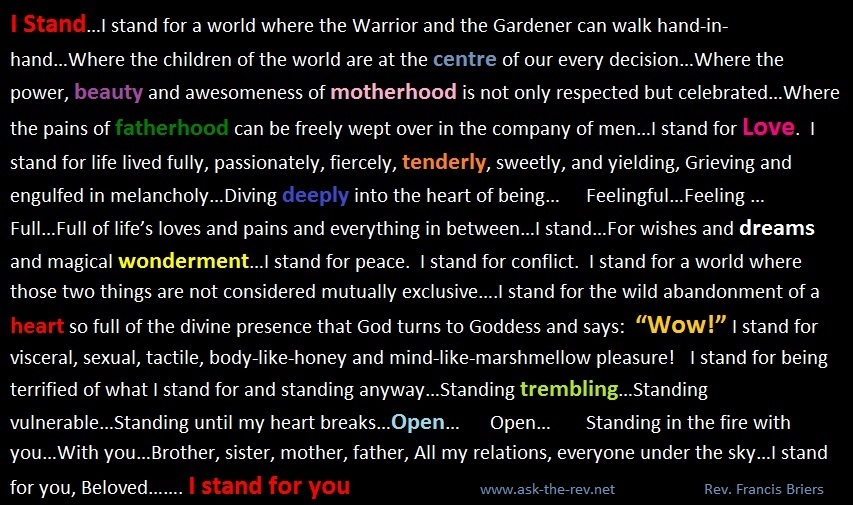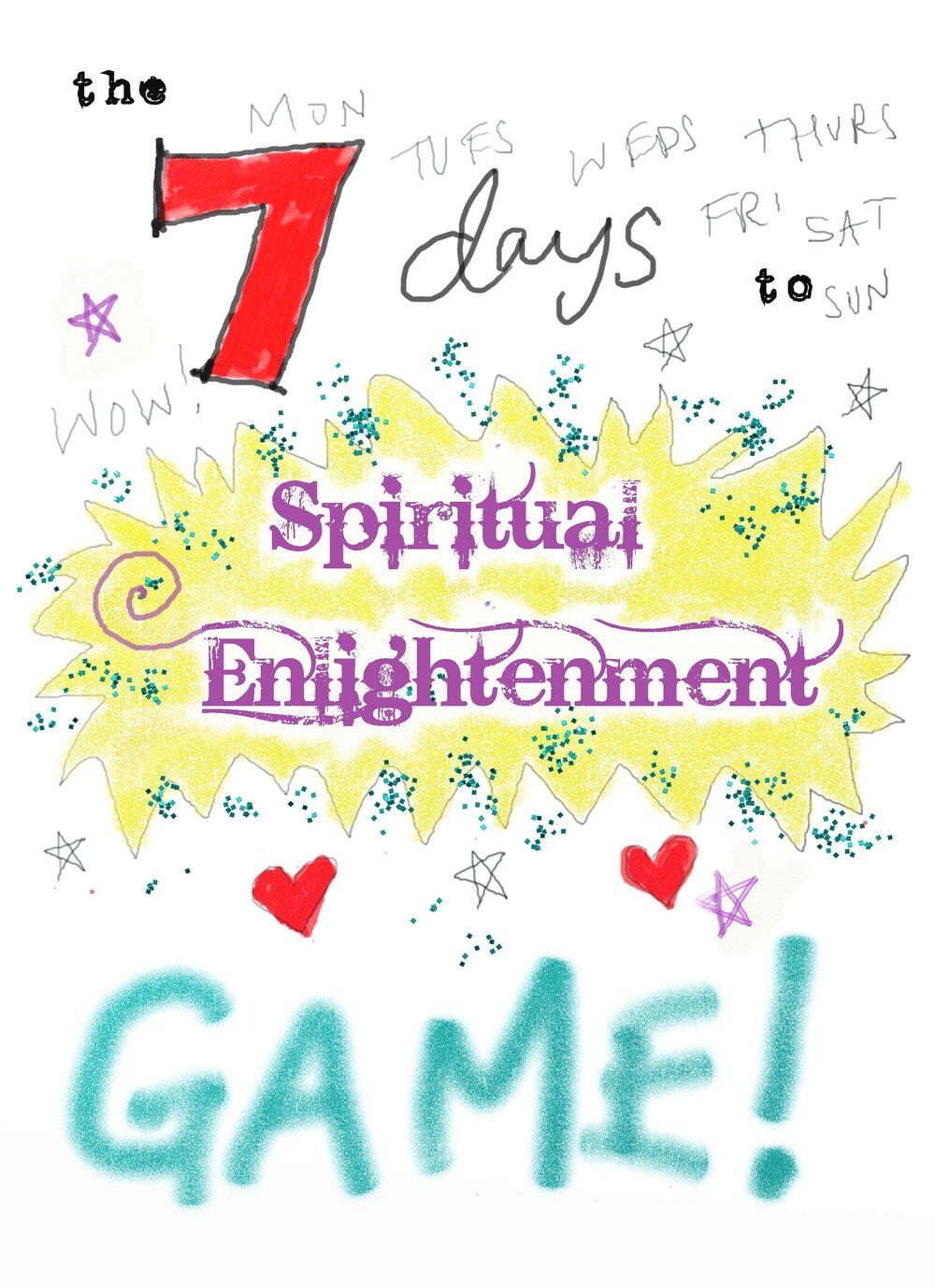
I’m not your classic activist. I’m not the guy who forms or joins the crowds marching for a cause. However, I do make a strong stand in the world for what I believe in and I think that makes me an activist of another sort.
I greatly admire those who step out and shout, campaign, petition, take to the streets and generally make social and political noise such that they influence the course of events, sometimes I wish I was one of those people. Certainly I have a strong social conscience and a desire to see change in the world, but that is not my way. I believe there are many ways to make a stand in the world, to challenge the status-quo, and to birth new ideas and ways of living into our societies. Two of the people who most influenced me as a child and young man were not obvious activists either.
One was a teacher at my middle school, Mr. Chant. I had some wonderful teachers at that school and yet I struggle to remember many of their names over 20 years down the road. Mr. Chant has always stayed with me even though I don’t think I ever had him as a teacher. I was in an after-school club that he ran, but even there he seemed a fairly distant figure. For all that, Mr. Chant was an inspiration to me. He was a man that I admired. I couldn’t have told you then why and I’m not sure I can do much better now but more than anything it was about his quality of presence. In his every act, and seemingly in his very quality of being he seemed to emanate a deep sense of quiet caring. I later found out that he was a committed Christian and I can certainly see the best of the Christian values expressed through his manner and choices in life, but I never knew that at the time. He wore his faith very lightly and I never heard him speak about it. In spite of that, once I found out he was a Christian, I felt more compelled than by anything anyone else had said to explore Christianity. Mr. Chant expressed a quiet activism born of living a particular kind of life and, in my assessment as an adult looking back, being a beacon of love. Those memories drawn from my formative years may be viewed a little through rose-tinted glasses, but still, I hold Mr. Chant as a strong example of how our every action can be a moment of activism.
The other person is an inspiring lady who set up a musical theatre company in my village. It is a pretty big village with the population of a small town and I think a lot of people from my parent’s generation moved there to have families, so in my generation there were a lot of kids in the village. There wasn’t a lot to do. The nearest town was just far enough to make it difficult to get there. As I remember it, you had one of two choices once you hit your teens in New Ash Green: sit on a bench near the shops drinking cider, or join the theatre company! Now in saying that I don’t want to give the impression that it was a last ditch. There was a waiting list to get in and the productions were of a very high standard winning national competitions and even touring to the Edinburgh Festival one year! What I’m trying to get across is that one lady named Syd and her husband Chris started something which gave hundreds of young people over the years a different choice. They, along with the help of a team of parents who volunteered their time, opened a door to a place where we could be creative, learn life skills, relate to each other in a caring and respectful way, form intimate friendships that have lasted many years, and for some find the work they would go on and make their career. Syd and Chris both had backgrounds as West End (the area of London where Theatre is most present, a bit like Broadway in the US) professionals, and they gave their time for free: writing, directing, musical directing, rehearsing and producing performances with 50 young people year after year. For so many of us, they opened a door to another world. Again, Syd was not an obvious activist, but by the way she chose to live, her quality of presence and sense of professional discipline (regardless that we were not professionals), and her profound generosity in founding and running that theatre company, I see her as an amazing example of grass roots societal change. I see her as an activist.
So… In this post I want to ask you to consider what you stand for? What do you bring into the world by the quality of your presence and the actions you take? Whatever kind of activist you are – a quiet one like me and the examples I have given here, or a noisier one like those taking to the streets all around the world (and any combination of the 2 extremes), what do you stand for? As Augusto Boal, profound creator of societal change, theatre director, and lately politician said in his book ‘The Rainbow of Desire’:
“Every action is a political action”
So what are you standing for in the actions in your life? What world are you creating in the practices and habits you sustain? What are your politics – not in terms of parties and votes but in terms of what you embody as you walk through this world?
To help frame these questions, I want to offer a distinction, and that is between what I term as an activist and a reactionary.
The simple distinction is that a reactionary is against something, while an activist (or true activist, in my judgement) is for something.
Spotting what you are ‘against’ can be a helpful way to work out what you are ‘for’ but otherwise it is a slippery path to unhealthy conflict and is likely long term to drive people away from your cause. The ‘against’ position is too often a source of unfiltered, angry rants, and easily leads you into getting stuck trying to make someone else wrong rather than finding ways to set the world right. This is something we were encouraged to consider deeply when we were training to be Interfaith Ministers. Afterall, if we are truly to embrace every person having their own path to God (or the Goddess, or Spirit, or Tao, or Buddha Nature, or Allah…etc) then we would not be walking our talk to be against particular spiritual paths. I can tell you from direct experience that it is hard to sit with a fundamentalist and completely accept their faith when they essentially reject yours as ‘wrong’ but that is my commitment. That stance is part of my activism. That doesn’t mean that I don’t have an opinion or feelings about it, but I choose not to impose my opinions or feelings on you. I can’t promise I always manage it perfectly – I’m human and make mistakes – but I do my best. This means I have to relinquish the easy comfort of believing in an objective truth. That’s not to say I embrace total relativism where everything is totally up-for-grabs, but I find it both more useful and more congruent with my experience of life and the world around me to go with the idea of what Oriah Mountain Dreamer calls ‘intersubjective truth.’ There are aspects of our world which we can agree upon and these serve as useful and reassuring reference points but we need to beware of seeing these as objective truths because if we do then should someone challenge this status-quo, they will likely be ostracised at best, and destroyed at worst. Many people have been destroyed for just this reason, and many of them were later found to be right (Copernicus being one example) and even if they are as crazy as they seem I would suggest such a person deserves our compassion, not demonising. It can be tough to stand strongly ‘for’ something without the refuge of making others objectively ‘wrong’, whilst also maintaining your own clarity and moral compass, but that is also my commitment.
The position of being against something has 2 key dangers as far as I can see: Firstly that your purpose is dependent on the very thing you are trying to fight. For example, if I am against pollution then if I succeed in my mission then I simultaneously lose my purpose in the world. In this way, people and groups can get so caught up in making their adversaries wrong and fighting against them that any potential for creativity, real problem-solving, and collaboration with the very people best placed to solve the issue (e.g. polluters). It ends up being about the fight, not the issue. Even if you win the fight, your prize is to suddenly have a total void of purpose in your life. If you are ‘for’ something then you can keep working for that probably indefinitely and just adjust your course as you achieve things (e.g. being for a cleaner world, rather than against pollution). Secondly, if you are ‘for’ something then people can join you or not. If you are ‘against’ something then it doesn’t take long before anyone who isn’t with you is against you! Obviously long term and in the extreme this can become a horrible kind of extremism which can justify hideous acts for the sake of ‘the cause’ perpetrated against any who stand against you (read “aren’t with you”). But even in it’s smaller expression, this position can breed a kind of subtle violence where you are always banging on about your mission, flooding your friend’s email boxes, and bending their ears at every party.
Hopefully in all this you can see the power of being an activist and the dangers of tipping over into becoming a reactionary. So… I’ll ask again, regardless of how loudly or quietly you are stating your position, whether you live it purely through your presence or you are marching on the streets, and campaigning on every front…
What do you stand for?

